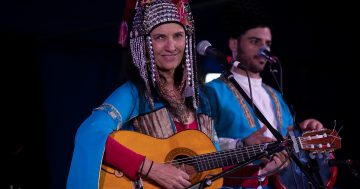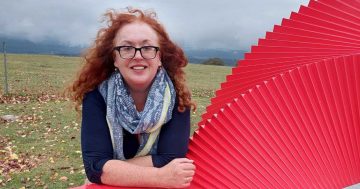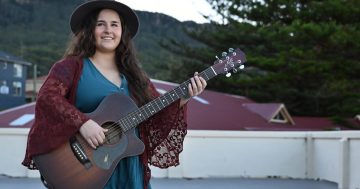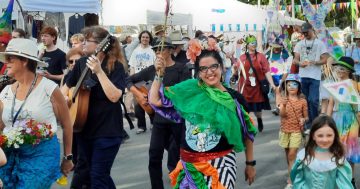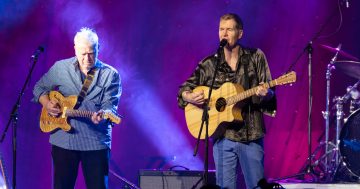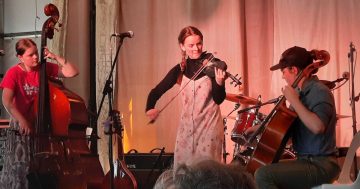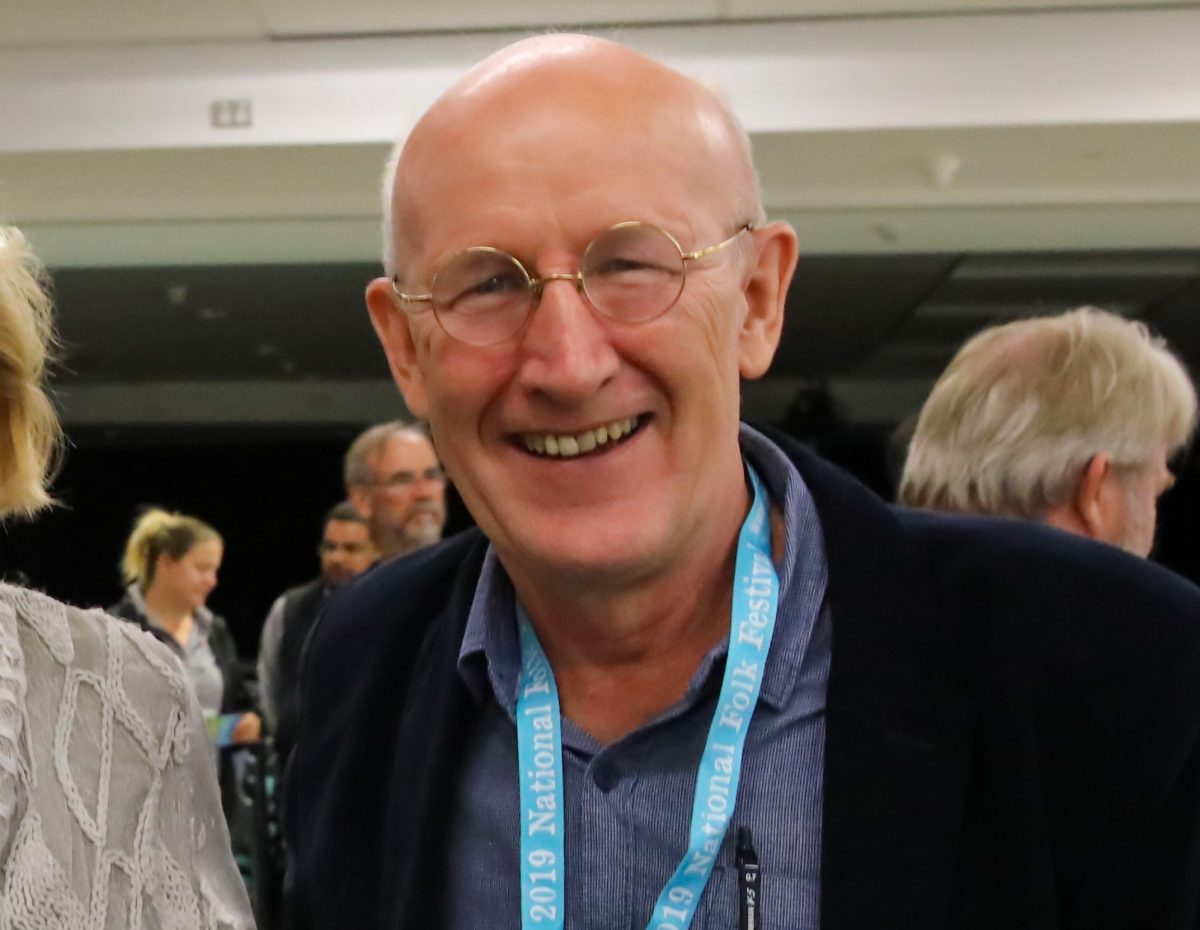
Former National Folk Festival director Phil Wilson was instrumental in cementing Canberra as the festival’s permanent home. Photo: NFF.
A dynamic Morris dancing Englishman who established the National Folk Festival in Canberra on a permanent basis has died in Bali at the age of 76 after contracting dengue fever.
The festival has paid tribute to Lancashire-born Phil Wilson, a director from 1993-1999 who built it into a lasting annual event that attracts thousands of folk fans from across the country every Easter at Exhibition Park.
“Phil was a much-loved member of the folk community and instrumental in laying the foundations of the festival as we know it now here in Canberra,” a festival spokesperson said.
“We are inspired by the passionate energy Phil dedicated to the festival and continue to look to our past to plan for the future. We extend our sympathies to his family and all who knew him.”
The man who employed him to run the first festival at EPIC in 1993, then director of the Australian Folk Trust Graham McDonald, said Phil was a pro-active operator who got the best out of people.
“He went looking for things to do. He didn’t sit back and wait for it to happen,” Graham said.
“He was just energetic, full of ideas, innovative in the best way and a thoroughly nice person.”
Before 1993, the festival was staged at different sites around the country each year. But by 1992 it was steadily losing money and running out of steam. It either had to fold or find a permanent home.
Graham said EPIC’s manager at the time, whose wife worked for the trust, offered a three-year deal for the festival to be staged there.
The trust secured government seed funding to employ a director. A national search landed Phil, who was living in Queensland at the time where he’d been involved with the Maleny Folk Festival.
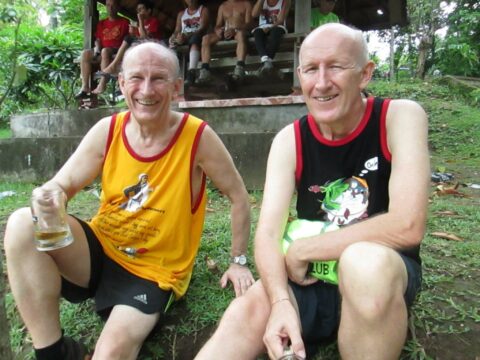
Phil with his brother Mark. They were keen runners and members of Bali’s Hash House Harriers. Photo: Bali Discovery.
He moved to Canberra and set himself at a card table at the end of Graham’s office in Gorman House, sharing a phone line, and in six months produced a festival.
“Luckily, we were able to pull in a lot of the volunteers who worked on the ’92 festival at the ANU,” Graham said. “So we had a core group who knew what they were doing.”
He said Phil didn’t try to reinvent the wheel but gradually built the festival up.
“He was looking at about a 15 per cent growth each year, not trying to double in size or anything like that, just a gradual build-up matched by adding venues and increasing the numbers of volunteers and the complexity of their roles,” Graham said.
He said Phil saw what was available and made it work.
Phil was very much influenced by Bill Hauritz, who ran the Maleny then Woodford Folk Festival for 30 years, and inspired loyalty and a willingness in people to want to help and work to make things a success.
He had faith in giving people responsibility and that they would deliver.
“One of his great skills was just getting people to do stuff,” Graham said. “Here’s a budget of $20,000 to go and do this, and send them off to spend money and do a job to make one particular bit of the festival work.
“When I later went to work for the public service for 10 years we’d have a three-day meeting to decide how to spend $10,000.”
Graham said for a decade residents from Ainslie Village, long-term unemployed people with serious mental health problems, ran the second bar.
“You had a quarter of the wastage that the other bar had … and just no sense of any dodgy stuff going on,” he said.
In those days it was all cash. Volunteers would deliver backpacks full of cash to the ‘treasury’ for counting without a hint of theft.
A favourite Phil story posted on social media recalled the year a bunch of teens crawled through the stormwater drains to break in and attend the festival for free.
“Everyone was freaking out! Phil was like ‘I’ll handle this’ and went to the drain, where he handed the teens wristbands … then he told them next time they should just volunteer!”
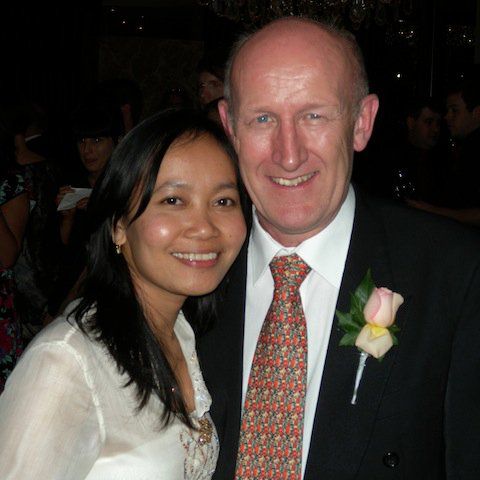
Phil with his Balinese wife, Awie Ambarawati, when they married in 2003. Photo: Bali Discovery.
By the new millennium, the festival was on a sure footing with attendances rising from 8000 in 1992 to 42,000 in 1999.
Phil moved back to England where he attempted to drag the English folk dance and song society into the modern era.
He returned to Australia briefly but in 2002 moved to Bali where his brother ran a restaurant and was then honorary British consul. Phil, a qualified engineer, set up a building maintenance business and married a local woman.
Graham said that after the 2002 Bali bombings, Phil and his brother Mark did an astonishing amount of work helping and repatriating British citizens injured or killed. For this, both were awarded the Order of the British Empire.
Phil also did humanitarian work as a consultant building earthquake-resistant maternity units on behalf of AusAid, monitoring building design and construction quality, and designing and supervising the installation of water supply systems.
Since 2007, Phil served as chairman of the Peduli Munti Guning Foundation, which provides disaster and humanitarian relief for those living on the eastern slopes of Bali’s sacred Mount Agung.
Before emigrating to Australia, Phil did specialist, difficult and dangerous repair work. This included at the Heysham Nuclear Power Station in Northern England, underwater at the Brent Bravo Oil Rig base in the North Sea and sealing toxic leaks on the Tanio – an oil tanker that broke up and sank in the English Channel.
Phil is survived by his wife, Awie Ambarawati, two adult daughters, Emily and Susie, and an infant grandson, Wallace, living in Australia.
A convert to the Islamic faith, Phil was buried following Muslim practice shortly after he died in Denpasar, Bali.












